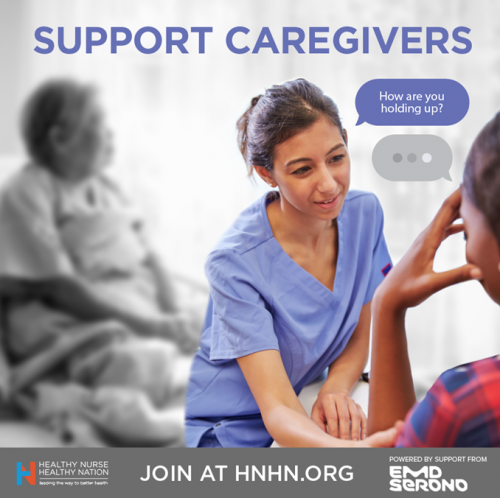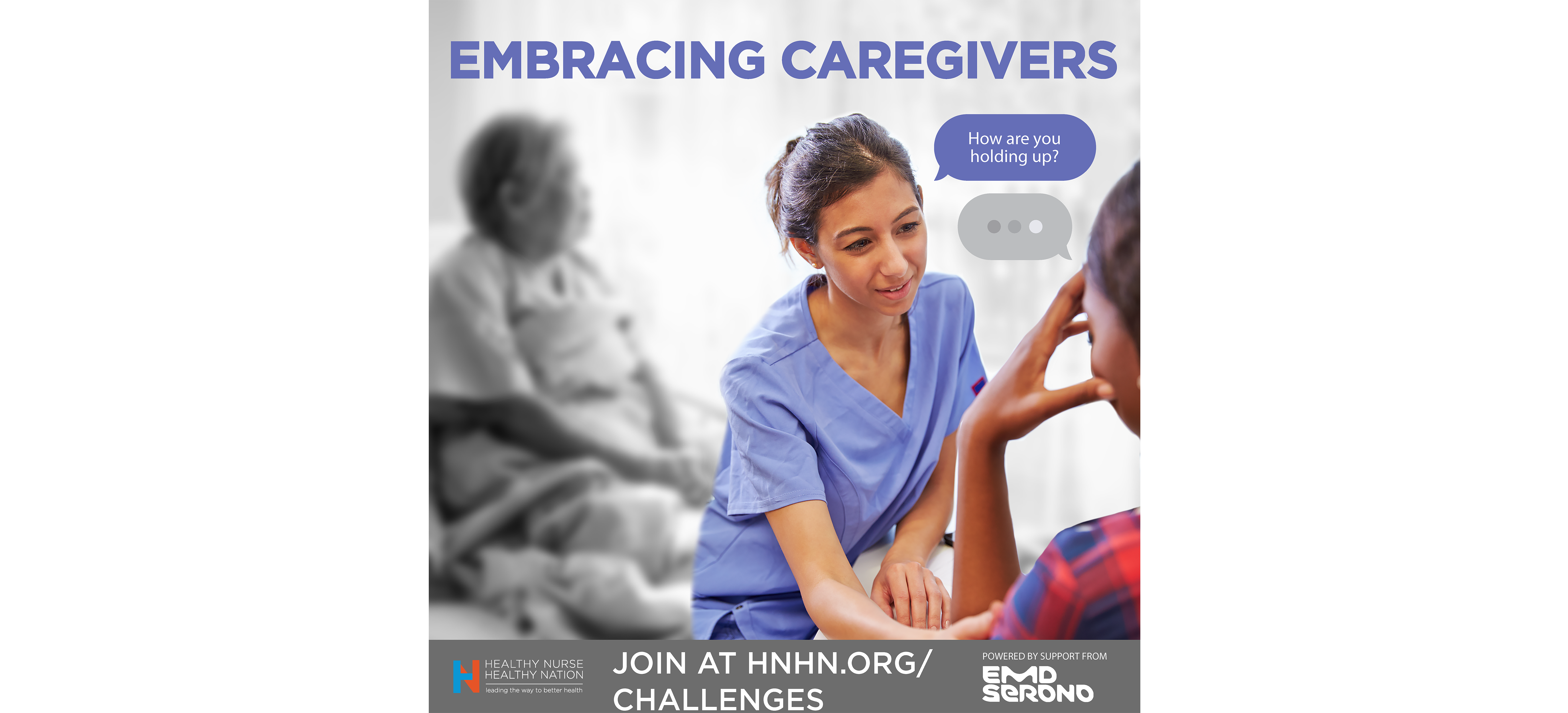Healthy Nurse, Healthy Nation™ Blog - Caring For The Family Caregiver
 Editor's Note: This blog was previously part of a Support Caregivers Challenge powered by support from EMD Serono.
Editor's Note: This blog was previously part of a Support Caregivers Challenge powered by support from EMD Serono.
Nurses have a great deal in common with family caregivers. Both selflessly give up their energy and time to care for another person(s). Both require daily patience, compassion, and resilience. And both often put others before themselves.
As nurses, embracing the family caregiver is just as important to the well-being of our patients as caring for the patients themselves. When patients leave our care, it’s up to the family caregiver to continue to provide that care. We have to pass the torch. And when we do, we want to feel confident that our patients are in good hands, regardless of our nursing specialty or practice setting.
To ensure that’s the case, we need to:
1. Identify a family caregiver for each of our patients
2. Provide plenty of information and guidance to that family caregiver before the patient leaves our care
Just as we must care for ourselves so we can care for others, family caregivers must care for themselves so they can care for their loved one. Here are some critical focus areas:
Nurses and family caregivers alike can benefit from resources and support tools. The first stage of caregiving is often the most difficult since caregivers don’t know what’s needed or what to expect. Your support and encouragement can help. Assist them in learning about the disease or disability their loved one is dealing with. Educate the caregiver on administering the proper medications and medical interventions. Explain the importance and WHY of the health care providers’ and specialists’ orders.
Alleviate isolation and loneliness. Ensure the caregiver is aware of help and resources available from local health departments or the department of aging. Assistance in the form of food delivery, visiting clergy, community volunteers, extended family, the book mobile, drop-in care, respite care, social workers, hospital liaisons, and others can lighten the load for caregivers. Ask whether they have reliable internet and phone service. Those are crucial to being able to research and access these types of resources.
Acknowledge and intervene with caregiver feelings of fear, sadness, and hopelessness. About 20% of caregivers suffer from depression — that’s twice the rate of the general population. It’s a silent health crisis and you have an opportunity to make a positive impact. As you meet with and talk to caregivers, look for depression warning signs and offer advice and resources to help. In this situation, crisis intervention is key.
Encourage questions and ask questions. For example, you can ask: What most concerns you in caring for [patient’s name]? Is there anything you feel uncomfortable doing? Are you familiar with [patient name’s] insurance and health care providers? Do you know what to do if….? Answers to these questions can guide your conversation and direct you to specific advice and resources most helpful to individual caregivers.
You can support family caregivers by recognizing and helping to address common warning signs of burnout. When you check in with a caregiver, there are many questions you can ask. Focus areas for successful caregiving include eating right, exercising, and getting enough sleep. Talk to the caregiver to ensure they are finding time for all three to avoid burnout.
Offer praise and positive support. Point out any care that is well done. You could say, “[Patient name] has been bedbound for two months now and he/she has no bedsores. Good work!” Point out their extra efforts, no matter how small, and thank them. Compliment the caregiver when you can, whether it’s on a clean room, a well-behaved dog, or even an attractive flower garden. If needed, use constructive criticism to educate the caregiver and build their confidence.
Be a mentor and role model of wellness — show the caregiver the importance of taking care of yourself first, so you can take care of others. Incorporate healthy lifestyle changes into your own routine, then share your insights with your patients’ caregivers. Sometimes it’s easier to create a new habit or change a bad habit after witnessing an example of how it’s done right. You can be that example. Remind the caregiver that they can’t take care of their loved one if they don’t first take care of themselves.
What are your thoughts? Let us know in our discussion.
.
Updated 2/17/22



Post a Comment or Question